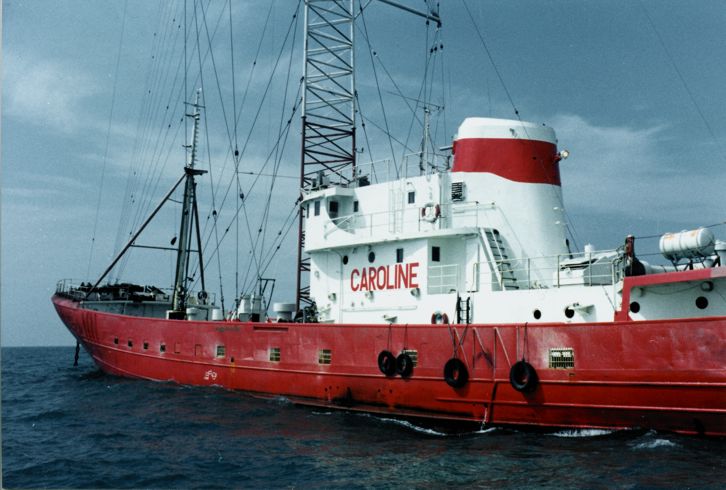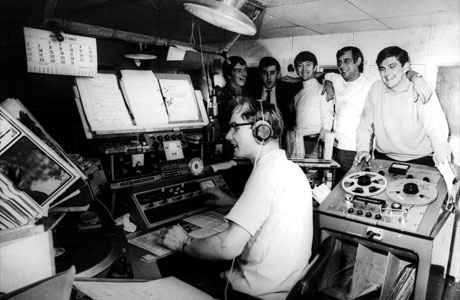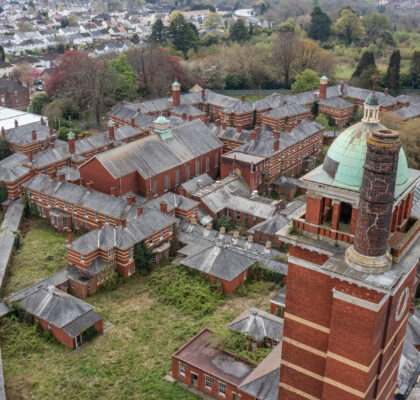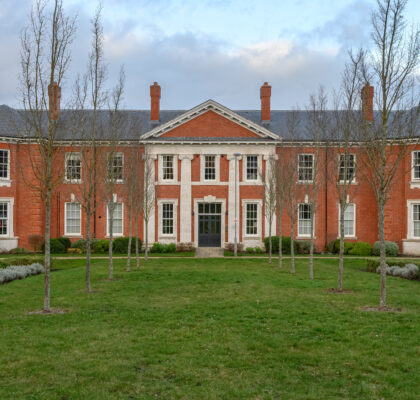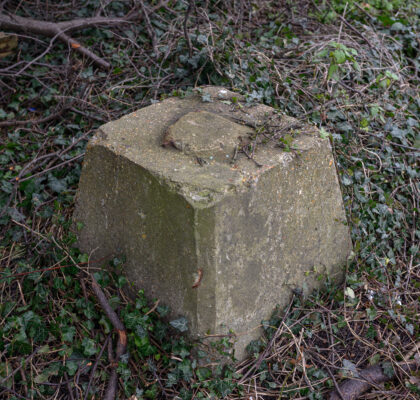Photos from Offshoreechos.com and Thevoguevibes.com
Radio Caroline, one of the most famous radio stations in the UK was launched 50 years ago today, just off of the Essex coast. Founded in 1964 by Ronan O’Rahilly, it is considered the first proper kick-start of popular music broadcast however Radio Caroline was unlicensed by any government for most of its early life which became formally illegal in 1967. The Radio Caroline name was used to broadcast from five different ships owned by three different owners from 1964 to 1990, and by satellite for over a decade up to 2013. Radio Caroline currently broadcasts 24 hours a day via the Internet and by occasional Restricted Service Licence. Ronan O’Rahilly was an Irish musician manager and businessman. Encouraged by the presence of the Scandinavian and Dutch pirates, Ronan O’Rahilly raised the capital to purchase a suitable vessel and in February 1964, he obtained a former 702-ton Danish passenger ferry, Fredericia, which was converted into a radio ship at the Irish port of Greenore, which was owned by O’Rahilly’s father. Financial backing for the venture came from six investors, including John Sheffield, chairman of Norcross, Carl “Jimmy” Ross owner of Ross Foods and Jocelyn Stevens of Queen magazine, with which Radio Caroline shared its first office with. O’Rahilly named the station after the daughter of US President John Kennedy, Caroline Kennedy. On a fund-raising trip to the US, O’Rahilly reportedly saw a photograph of Kennedy and his children which inspired the name “Caroline Radio”. In the photo, Caroline Kennedy and her brother, John F. Kennedy Jr., are apparently dancing in the oval office as their father looks on, an activity which O’Rahilly reportedly interpreted as a playful disruption of government.
With the decision made, The Fredericia was renamed MV Caroline and was anchored off the cost of Felixstowe, where it began test transmissions on Friday, 27 March 1964, 50 years ago today. The following day it began recording regular programming at midday with the official opening being conducted by Simon Dee. The first programme was pre-recorded and was hosted by Chris Moore. The first theme of the show was ‘Round Midnight’ by Jimmy McGridd which was a jazzy tune. Band The Fortunes, recorded a song in March 1964 called ‘Caroline’ which later became the main theme song. The theme can be listened to on YouTube here. The slogan of the station was “Your all-day music station” with tunes being broadcast from 6am-6pm, 7 days a week, to avoid competition from Radio Luxembourg. The station did however return at 8pm ad continued until after midnight to avoid direct competition with popular TV programmes. The target audience of Radio Caroline was housewives however they later targeted children and without serious compeition, they quickly gained a daytime audience of over 3 million listeners.
Only July 2nd 1964 the station was merged with Radio Atlanta, which closed that day at 8pm. The new station was called ‘Radio Caroline South’ and whilst MV Mi Amigo remained off Frinton-on-Sea, MV Caroline would broadcast as ‘Radio Caroline North’. BBC Radio 2 newsreader Colin Berry and Classic FM’s Nick Bailey started their careers reading the news on Radio Caroline South.
MV Caroline sailed from Felixstowe around the coast of Great Britain to the Isle of Man, broadcasting as she went with the only broadcast staff on board being Tom Lodge and Jerry Leighton. The two stations were thus able to cover most of the British Isles and some programmes were pre-recorded on land and broadcast simultaneously from both ships.
In October 1965, O’Rahilly bought Crawford’s interest in the MV Mi Amigo and engaged Tom Lodge from Radio Caroline North to make programming changes and regain the audience from Radio London. Tom Lodge hired a new group of DJ’s and introduced a free-form style of programming which, by August 1966, had succeeded, creating an audience numbering 23 million.
In 1967, the UK Government introduced the Marine Broadcasting Offences Act 1967, which outlawed advertising on or supplying an unlicensed offshore radio station from the UK. In an earlier House of Commons debate (in June 1966), the government had claimed that the pirate ships were a danger because of radio frequency interference to emergency shipping channels, and to overseas radio stations and the pirates were paying no royalties to artists, composers or record companies. Furthermore it was stated that the pirates’ use of wavelengths also broke international agreements. The Manx parliament (Isle of Man) attempted to exclude the North Ship from the legislation, appealing to the European Court on the legality of the act being applied to the Isle of Man. Two of the stations, Radio 270 and Radio London (out of 4 offshore stations) were closed, but the two Caroline ships continued with their supply operation moved to the Netherlands, which did not outlaw unlicensed ship based broadcasting until 1974.
When the act become law on 14 August 1967, Radio Caroline was renamed Radio Caroline International. Six weeks later, the BBC introduced its new national pop station Radio 1, modelled largely on the successful offshore station, Radio London, and employed many of the ex-pirate DJs. The BBC Light, Third, and Home programmes became Radios 2, 3 and 4.On 3 March 1968, the radio ships, Mi Amigo and Caroline, were boarded and seized before the day’s broadcasting began. They were towed to Amsterdam by a salvage company to secure unpaid bills for servicing by the Dutch tender company, Wijsmuller Co.

